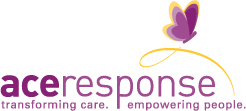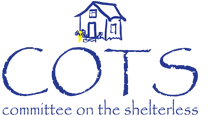How We Help
Committee on the Shelterless (COTS)
The Committee on the Shelterless (COTS) is the first example of an Integrally-informed and Integrally-developed non-profit social service agency that has employed the Restorative Integral Support (RIS) model to integrate ACE Study findings with knowledge of resilience and recovery.
COTS' leadership engaged staff in an organizational development process focused on bringing together locally available best practices and emerging body-oriented trauma treatments within the context of a therapeutic community. The following steps were involved in this process:
- Staff learned about adverse childhood experiences, resilience, and recovery.
- Staff were engaged in reviewing best practices in light of ACE research.
- Staff were involved in articulating the values and principles guiding agency culture and program design.
- Agency leadership set the tone for the culture, providing role modeling of healthy behaviors.
- Policies and procedures are developed to facilitate a culture of recovery and transformation.
- Agency culture supports the self care and development of staff persons who provide relationship building and role modeling for clients.
- Staff support the development of healing social networks for clients recovering from ACEs and overcoming other adversity.
- Staff persons' skills and locally available best practices are brought together within the context of a compassionate culture.
Each COTS program addresses ACEs, offering supports and skill-building from distinct angles. Today, the multiple services offered by COTS include:
- The Petaluma Kitchen, offering food and outreach services
- Case management, a core element serving people across programs
- The "Mary Isaak Center," housing emergency shelter and transformative programming developments fueled by the transition team process
- Transitional Housing
- Skill-building programs and specialized support services (such as Rent Right, Work Right, Kids First)
- On-site health, dental care, and mental health/crisis consultation
- A somatic experiencing (SE) clinic
- "At Home Within" programming (includes yoga, Qi Gung, mindfulness meditation, drumming, visualization, and integrative restoration)
- The Family Connection Program -- teams of volunteers support families exiting homeless situations to establish healthy social affiliations in the community
- Permanent housing
Use of the RIS model has led to a dramatic increase in COTS' ability to house homeless and chronically homeless adults:
- In 2004 - 2005, COTS housed 8 of 646 clients with conventional case management techniques, fewer programs, and the same number of full-time program staff.
- In 2008 - 2009, 283 of 590 unduplicated individuals were successfully housed in transitional or permanent housing.
With family homelessness on the rise, children are at a higher risk for ACEs and associated later life outcomes, potentially contributing to a vicious cycle of homelessness and related social problems.
COTS' high impact programs are implemented in a cost-effective way through:
- Community involvement
- Relationship-building and advocacy
- A strong volunteer network
Service Outcomes Action Research, enacted from an Integral perspective, is proposed as a next step to provide comprehensive evaluation of the RIS model. Research and knowledge can be further developed as other agencies begin to implement the flexible RIS framework.


